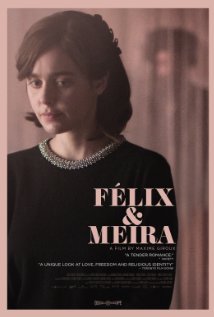
FELIX AND MEIRA
Canada, 2014, 105 minutes, Colour.
Hadas Yaron, Martin Dubreuil, Luzer Twersky.
Directed by Maxime Giroux.
Felix and Meira is set in Canada, the city of Montréal, and more specifically in an enclosed Jewish community, Hasidic in its traditions and outlook.
Meira is a young woman, wife and mother, married to an earnest Hasidic man, steeped in the traditions, devout, but with somewhat chauvinistic expectations of his wife and her behaviour. Meira, has a love of music, finds the restrictions overwhelming, does not find good company in the other wives.
A chance encounter with a man at a bakery leads to further meetings. He has come to the city for the burial of his father, a man who had little time or for his son. When Meira visits, she is able to listen to music, and her world begins to open up – even to overcoming the injunction not to look a person in the eye when speaking and communicating.
The husband tries to influence his wife but she is caught up in this broader world, in the world of Felix – and, although she relishes the freedom, which is burdened by the past restraints. The film ends with a trip to Venice – which may or may not lead to happiness.
A quite slow-moving drama which gives the opportunity for the audiences to identify with the characters, situations and challenges.
1. A Canadian story? The Jewish story? Jewish perspective, the perspective of audiences outside Judaism?
2. The Canadian city, homes, synagogue? The family, Hasidic? The feel, the isolation, place in society? The contrast with the “outside” world? The locations, the atmosphere, the musical score and use of Jewish themes?
3. Hasidic men, their dress, the customs, expectations, marriage, family and children, men treating their wives? Love, sexual relationship? Control? Audience response to the Hasidic men? The wives?
4. Meira, a woman in this society, accepting her destiny, critical of her destiny? Her relationship with her husband, the Hasidic customs, prayer, gatherings of men? Women in the synagogues? Her dreams, hiding the music, loving music, sketching? Her hopes, the beliefs, relationship with her daughter? Interactions with her husband, discontent? The detail at home, going out, the other women and her relationship with them? Coming to the house?
5. Felix, his age, experience, the death of his father, the feelings of estrangement? His meeting Meira, food in common? The relationship, his being secular, not religious, his comment about the emptiness of his life? The gradual friendship with Meira, her coming to the house, wanting to listen to music?
6. The husband, his background, the puzzle with his wife, his requirements, wanting her to change? Going to the synagogue, study and prayer? His challenge to his wife, how sympathetic, able to understand what she was going through – and his hopes, the possibility of letting her go?
7. Felix asking Meira’s advice, that he wasn’t religious, her reaction, gradual response at first, gradually gaining confidence, the visit, the music? Her opening up, the difficulty of looking men straight in the eye, the trying on of the jeans…?
8. Felix, the change in him, his apartment, Meira’s visits? His donning the Hasidic garb?
9. The development of the relationship, how much love, her desire for freedom, how much independence?
10. Felix, his encounter with Meira’s husband, the interactions, understanding?
11. The finale, Venice, the couple together, the wisest of decisions? their love, the future?